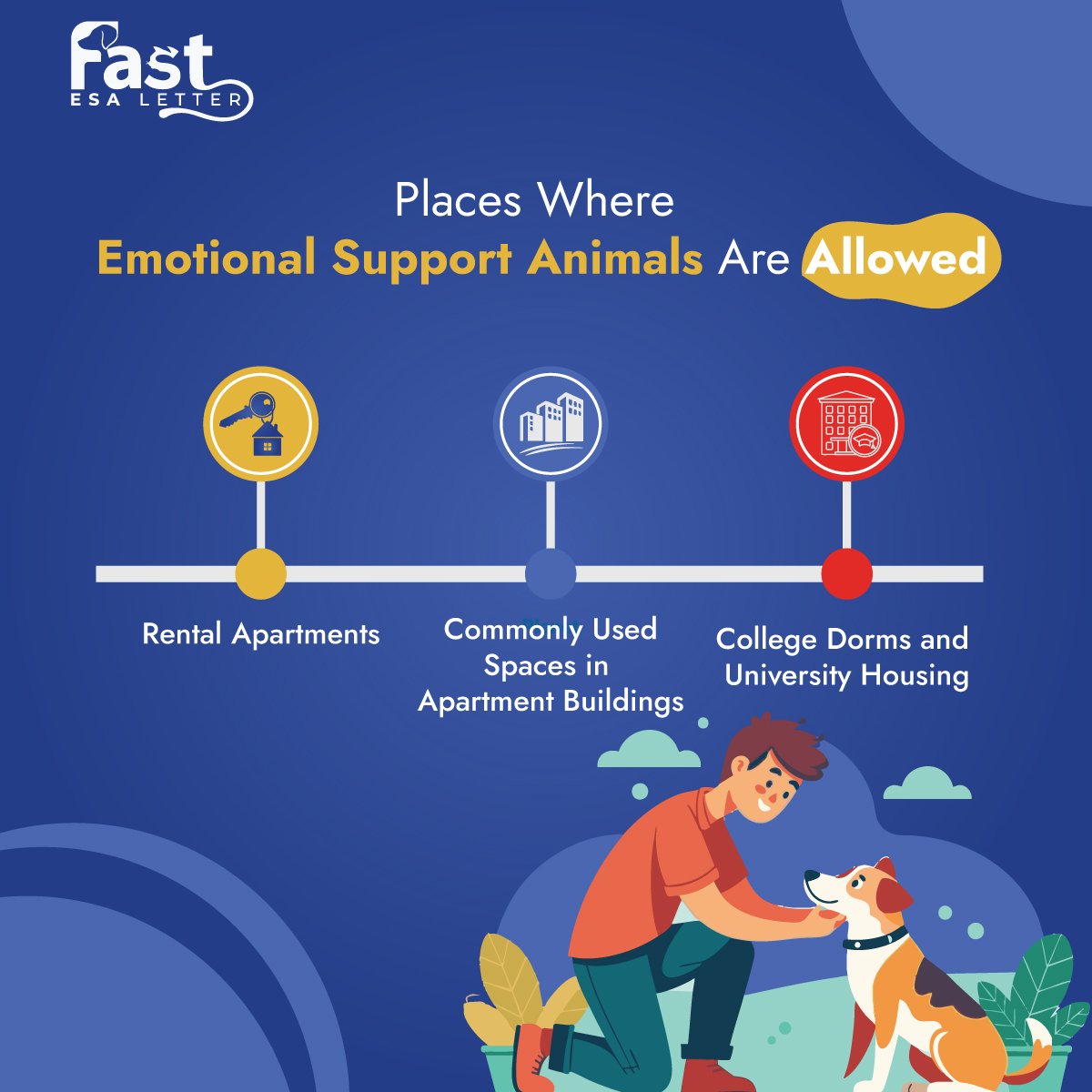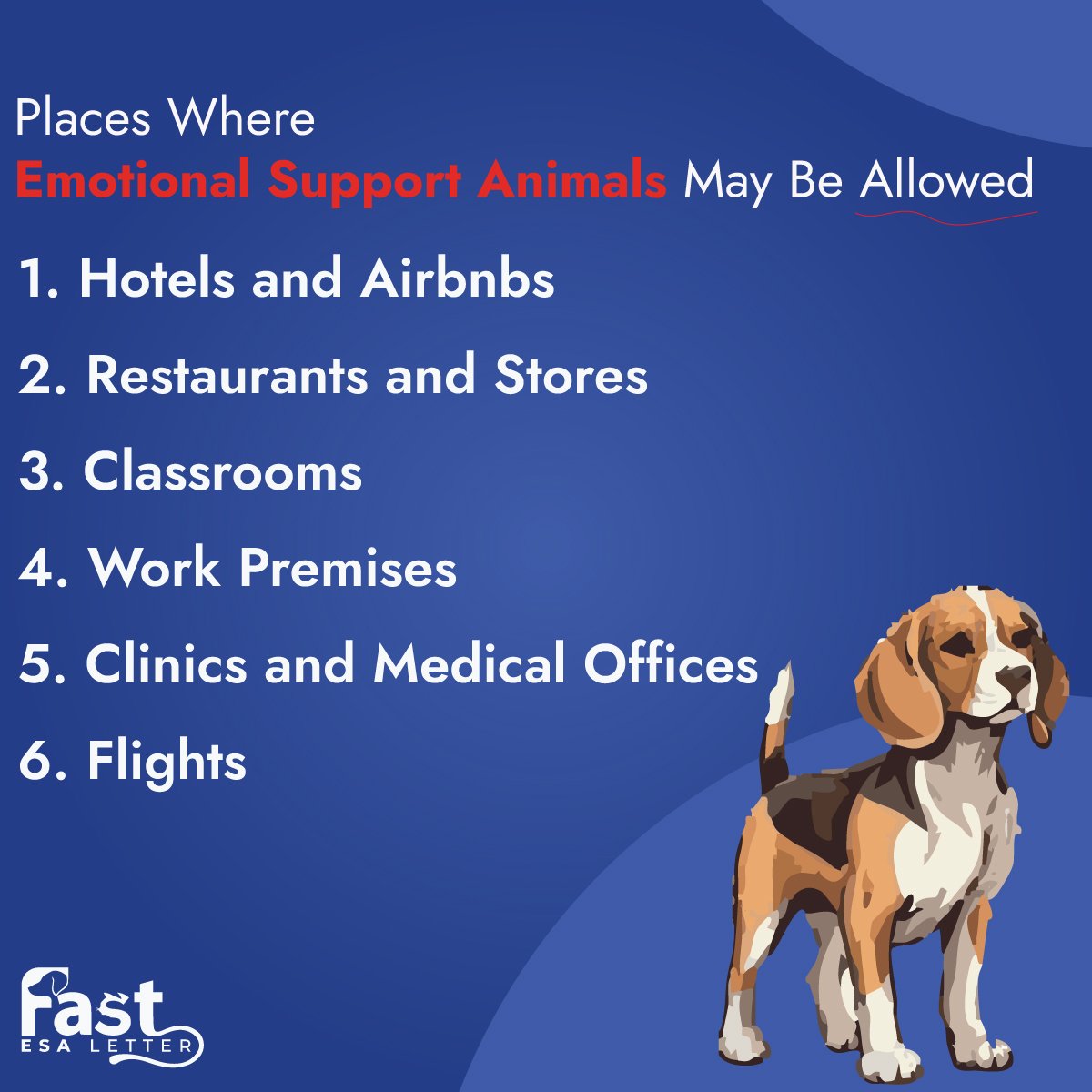Where Can I Take Emotional Support Animals?
You can take your emotional support animal to your house, college dorms, and pet-friendly public places. Some states, like California, allow ESAs in the workplace, but specific rules and policies vary by state.

Robert Clendenin, MD
An Emotional Support Animal (ESA) is covered under the Fair Housing Act. They are allowed to stay with their owner in rental accommodations, Airbnbs, common use spaces in apartments, dorms, and university housing.
Having the company of an emotional support dog or other ESA can significantly enhance your well-being. However, ESAs have a few limitations due to their lack of specialized training. If you have recently received your ESA letter, it’s crucial to educate yourself about the proper use of your emotional support animal before taking them to various places. Understanding where emotional support animals are allowed helps ensure that you and your ESA remain compliant with legal and community guidelines.
In this blog, we have compiled a list of places where you can legally take your ESA, as well as places where they are not permitted. We encourage you to read this blog until the end to maximize the benefits of your ESA Letter.

Can My Emotional Support Animal Go Everywhere?
No, emotional support animals cannot accompany their owners everywhere. For example, can emotional support dogs go into stores? The answer varies. They are covered under the Fair Housing Act, which allows them access to a limited number of places. We will discuss these places further in this blog.
The limited access is because emotional support animals, including emotional support dogs, lack specialized training to perform specific tasks, unlike service dogs. Consequently, many public places, such as stores, restaurants, and grocery stores, restrict ESA access. This raises questions like are emotional support animals allowed in restaurants? Often, they are not, unless the restaurant has pet-friendly policies.
ESAs are primarily intended to provide mental or emotional support to their handlers by simply being present during tough times. As an ESA owner, it is important to understand that while your pet is incredibly beneficial to you because of the emotional bond you share, they may not behave the same way towards others. Because they can potentially pose a threat to other people, their access is limited.
Places Where Emotional Support Animals Are Allowed

1. Rental Apartments
At the top of the list is the rental apartment where you live. ESAs are privileged with special rights under the Fair Housing Act. Landlords cannot discriminate against you if you have an emotional support animal assisting with a mental or emotional disability. Furthermore, landlords cannot charge any fees or security deposits for allowing an ESA on the property. Emotional support animals are also allowed to bypass housing policies, including “No-Pet Policies.” In short, as long as they do not cause any trouble, they can stay with you for free.
2. Commonly Used Spaces in Apartment Buildings
3. College Dorms and University Housing
Places Where Emotional Support Animals May Be Allowed

1. Hotels and Airbnbs
2. Restaurants and Stores
3. Classrooms
4. Work Premises
Many ask, can I take my ESAs in workplaces? Some employers, particularly in states like California, accommodate ESAs under workplace accessibility policies. However, not all states follow similar rules. ESAs in workplaces are not officially recognized, and it is up to the employer to accept or deny any request.
5. Clinics and Medical Offices
6. Flights
Previously, ESAs were allowed to fly in the cabin, but regulations now treat them as pets. To determine if ESA dogs go on flights, check with airlines about their pet policies.
Common Myths About Emotional Support Animal Access
1. ESA Can Accompany You Everywhere
2. ESA Are Allowed at Work
3. ESA Are Allowed in Classrooms
4. ESA Can Visit Places of Worship
I Want to Live, Travel, and Access Public Places with My Pet. What Should I Do?
Emotional Support Animals have limited rights and cannot accompany you everywhere. However, if you feel that you need emotional support from your assistance animal, you can designate them as your psychiatric service animal. It is important to note that only dogs can qualify for this designation, and additional training is required so they can assist with your disability.
Conclusion
Stay informed about hotels and ESA policies, store regulations, and other areas where ESA access may differ. Educating yourself not only enhances your relationship with your pet but also helps ensure a positive experience for those around you.
Frequently Asked Questions
Can I Take My Emotional Support Animal To A Doctor’s Office?
Where Can I Take My Emotional Support Animal For A Walk?
Can Emotional Support Animals Go To The Beach?
Can Emotional Support Animals Enter Libraries?
Are Emotional Support Animals Allowed In Theaters Or Cinemas?
Can Emotional Support Animals Go To Coffee Shops?
Can Emotional Support Animals Go On Trains?
Can I Take My Emotional Support Animal To A Gym?
Are Emotional Support Animals Allowed In Stores That Sell Food?
Can I Take My Emotional Support Dog To Walmart?
Can I Take My Emotional Support Dog To Stores?
Can My Emotional Support Animal Be In The Common Areas?
Can My Emotional Support Animal Come To Class With Me?
Post Author
Prince Sharma
Related Articles
How Emotional Support Animals Help Veterans Reclaim Peace After Service?
How Emotional Support Animals Help Veterans Reclaim Peace After Service?Emotional Support Animals (ESAs) offer comfort and stability to veterans coping with PTSD, anxiety, and depression. They support veterans in rebuilding emotional resilience,...
Think Your ESA Is Illegal? These Laws May Surprise You.
Think Your ESA Is Illegal? These Laws May Surprise You.Breed restrictions do not typically apply to Emotional Support Animals (ESAs) under the Fair Housing Act (FHA). Landlords must accommodate ESAs regardless of breed, as long as they have proper...
Can a Guinea Pig Be an Emotional Support Animal?
Can a Guinea Pig Be An Emotional Support Animal?Yes, Guinea pigs can be a wonderful choice for emotional support animals. They offer comfort and companionship through their friendly behaviour. To have a guinea pig as an ESA, you’ll need an ESA letter...
Live Free with Your ESA!
An ESA Letter Unlocks Freedom!





